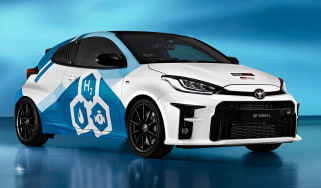Toyota GR Yaris review
Developed as a ‘World Rally Car for the road’, the Toyota GR Yaris is a ferocious little hot hatch

Is the Toyota GR Yaris a good car?
Some may have scoffed when they heard that the Toyota GR Yaris hot hatch was designed as a “rally car for the road”, but the brand has genuinely pulled it off, creating a seriously capable and entertaining machine that reminds us of the Subaru Impreza Turbo and Mitsubishi Evo cars we used to lust after.
With its standard-fit four-wheel drive system and compact supermini chassis, the GR Yaris will gladly be chucked around in any direction. Hit a straight and the 276bhp and 390Nm engine offers a respectable punch whenever you floor the throttle — all the more impressive when you remember that this is a turbocharged three-cylinder.
The Toyota GR Yaris doesn’t quite outshine our 2024 Hot Hatch of the Year, the Honda Civic Type R, but it does come pretty close for outright entertainment combined with genuine usability.
| Key specs | |
| Fuel type | Petrol |
| Body style | Two-door supermini |
| Powertrain | 1.6-litre turbocharged three-cylinder, 276bhp |
| Safety | N/A |
| Warranty | 3yrs/60,000 miles |
How much does the Toyota GR Yaris cost?
When it first arrived, the Toyota GR Yaris already commanded a strong starting price of nearly £30,000. However, this spicy supermini underwent a number of upgrades in 2024, and these have pushed the starting price up to over £44,000.
That sum will bag you a GR Yaris with a six-speed manual gearbox, if you want the automatic (and we’ll explain you might in a little while) you’ll need to add another £1,500 to your budget. There are also two special edition models that have had their drive modes configured by rally drivers Sebastien Ogier and Kalle Rovanperä. This is certainly a unique touch, but you’ll be paying out an eye-watering £60,000 for the pleasure.
Used - available now

2020 Toyota
GR Yaris
26,251 milesManualPetrol1.6L
Cash £26,999
2020 Toyota
GR Yaris
12,096 milesManualPetrol1.6L
Cash £29,800
2020 Toyota
GR Yaris
13,161 milesManualPetrol1.6L
Cash £30,600
2020 Toyota
GR Yaris
20,310 milesManualPetrol1.6L
Cash £28,767Even that entry-level £44,00 figure pushes the Toyota GR Yaris into the firing line of more upmarket hot hatchbacks like the Volkswagen Golf R (nearly £44,000), Mercedes-AMG A 35 (around £46,000), BMW M135 (£43,000) and the Audi S3 (£47,000). The Ogier and Rovanperä special editions, meanwhile, overtake the £50,000 Honda Civic Type R by nearly £10,000.
Toyota’s upgrades to the GR Yaris pushed the price upwards, but they did bring some notable changes to this fiery hot hatch, too. You’ll struggle to notice any real differences between the facelift and original models at first glance, but it’s underneath where the brand has addressed the older GR Yaris’ weakness.
Aside from the choice between a manual or automatic gearbox, there are few options for the Toyota GR Yaris line-up. All variants are powered by the same turbocharged 1.6-litre three-cylinder petrol engine, and this produces 276bhp across the board.
All GR Yaris models come with 18-inch alloy wheels, automatic headlights and wipers, smart entry, an eight-inch touchscreen with Toyota’s Smart Connect+ software including Apple CarPlay and Android Auto, a 12.3-inch driver’s display, dual-zone climate control and a rear-view camera. There’s a multitude of safety systems, too, including lane trace assist, road sign assist and intelligent adaptive cruise control.
Stepping up to one of the special editions brings some extra touches, but these differ depending on which one you go for. The GR Yaris Ogier adds in performance-oriented upgrades including an ‘Ogier’ driving mode, unique Stealth Grey paint, blue interior stitching, blue brake calipers and a carbon fibre rear spoiler. There are a few day-to-day extras thrown in, too, such as a JBL sound system, heated steering wheel and front and rear parking sensors.
For those who like their hot hatchbacks to be as loud and proud as possible, the GR Yaris Rovanperä adds a distinctive three-tone rally-inspired livery along with a large carbon fibre rear wing and red brake calipers. Inside, the striking exterior is complemented by a heated steering wheel with stitching that replicates the Finnish national colours (blue and grey). The enhancements aren’t just cosmetic, either, as this special edition also gets unique Rovanperä drive modes and a constant-velocity rear differential.
Engines, performance & drive
The brand hasn’t been shy in declaring the Toyota GR Yaris ‘A World Rally Car for the road’, so it needed to ensure its three-door pocket rocket lives up to such a billing.
Things get off to a pretty good start with its turbocharged 1.6-litre three-cylinder engine, which is designed to comply with world rally regulations. This is by far one of the most powerful three-pots in the world, and it’s more than happy to be worked hard. There’s a decent soundtrack to be enjoyed, too, along with plenty of mischievous turbo whistle.
A part to a series of midlife updates in 2024, the facelifted GR Yaris was given a power boost. Although its original outputs of 257bhp and 360Nm weren’t exactly modest, the fiery little three-cyl now pumps out 276bhp and 390Nm of torque. This large dose of power is combined with a kerb weight of less than 1,300kg, and it doesn’t take a genius to figure out the result.
| Model | Power | 0-62mph | Top speed |
| GR Yaris (all variants) | 276bhp | 5.2 seconds | 143mph |
What is the Toyota GR Yaris like to drive?
In town
The GR Yaris’ small size means it’s pretty much as easy to manoeuvre around the urban streets as its hybrid-powered namesake. The ride remains firm over imperfections and bumps at lower speeds, but it’s still perfectly tolerable.
On A- and B-roads
Hit the open road and, to put it simply, the GR Yaris is as fast as it is agile. It feels planted in just about every scenario and really inspires confidence as you push things to the limit (provided it’s wearing suitable tyres). Once the turbo spools up, the little Yaris starts to gain momentum at a serious pace, so you’ll need to keep a very close eye on the speedometer if you go anywhere near a public road.
Along with its tweaks to the engine, Toyota has also revised some of the suspension components. The front anti-roll bar has been stiffened and all four springs have been firmed up, too.
The GR Yaris is fitted with a GR-Four all-wheel-drive system as standard, and this has been revised in the facelifted car. It features three separate driving modes: Normal, Gravel and Track, with each one varying the power that’s sent to the front and rear wheels.
On the motorway
The GR Yaris does a better job being a motorway cruiser than its looks would have many believe, but it’s still a firm-riding, loud and rather thirsty car, so it’s difficult to recommend for a daily long-distance commute.
Engines, 0-60 acceleration and top speed
The revised 1.6-litre, three-cylinder turbocharged engine produces 276bhp and 390Nm between 3,250-4,600rpm, resulting in a claimed 0-62mph time of 5.2 seconds and a 143mph maximum speed. In comparison, our 2024 Hot Hatch of the Year, the Honda Civic Type R will complete the landmark sprint in 5.4 seconds.
While the thought of an automatic hot hatch will do little more than incur disgust in the eyes of some enthusiasts, the Toyota’s optional eight-speed Gazoo Racing Direct Automatic is a highly impressive transmission with rapid responses.
The six-speed manual does add in another layer of driver engagement, though, and it’s £1,500 cheaper to buy. Both put on a tremendously good show, so it’s just a question of personal preference and budget.
But, to focus solely on straight-line speed would be to do the GR Yaris a disservice, as its ability to travel cross-country with unnatural speed and agility would put most supercars to shame — it’s that good.
MPG, emissions & running costs
It’s probably fair to say that most buyers looking towards the Toyota GR Yaris aren’t really concerned about fuel economy and overall efficiency. Customers are far more likely to be enthusiasts with a stronger interest in lap times than MPG figures.
Regardless, the GR Yaris shouldn’t be too costly to run as it’s capable of around 32mpg on the combined cycle if you opt for the manual gearbox, although this drops to nearer 29mpg if you have the automatic. It’s worth remembering, however, that if you’re intent on exploiting the car’s full performance then you’ll see a marked drop-off in this economy figure. CO2 emissions of up to 215g/km also mean you’re unlikely to see many company car fleets taking on a GR Yaris.
Part of the tech that Toyota has engineered into the GR includes a revised direct fuel-injection system that helps to maintain economy and keeps emissions down.
| Model | MPG | CO2 | Insurance group |
| GR Yaris with six-speed manual gearbox | 32.5mpg | 197 | 43A |
| GR Yaris with eight-speed automatic gearbox | 29.7mpg | 215 | 43A |
Tax
Every variant of the GR Yaris costs over £40,000 when new, so they all incur an additional Vehicle Excise Duty (VED) road tax surcharge which applies from the second time the vehicle is taxed until it is six-years old.
Insurance groups
Insurance groups of 43-44 reflect the high performance nature and desirability of the GR Yaris. The Toyota’s ratings are very similar to those of the Honda Civic Type R, which resides in group 43.
Depreciation
The bespoke nature of the GR Yaris and how well it has been received, particularly in the UK, means that residual values should remain buoyant. Current data suggests that after a typical three-year/36,000-mile ownership period, the three-door hot hatch should retain around 56 per cent of its original list price.
To get an accurate valuation for a specific model, check out our free car valuation tool...
Interior, design & technology
From the outset, the Toyota GR Yaris has been designed to meet specific targets for downforce, aerodynamic performance, and stability. This means only the headlights, rear lights, door mirrors and the shark fin antenna on the roof are shared with the regular Toyota Yaris.
The body had to be specifically designed to meet the requirements of the World Rally Championship and, compared to the regular Toyota Yaris model, the GR is 55mm longer, 60mm wider and between 45-95mm lower in height due to its sloping roofline.
Toyota’s three-door design for the GR brings a coupe-like profile, while the tapered roofline has a functional purpose in helping to move air over the rear spoiler which helps to create useful downforce. The overall impression is of a squat, purposeful machine, with powerful-looking rear haunches just giving a hint of the Renault 5 Turbo.
Although Toyota revised the GR Yaris in 2024 with a number of upgrades, the only visual difference on the outside is some improved mesh grille to protect the radiator.
What is the Toyota GR Yaris like inside?
It’s on the inside where some of the biggest changes have taken place as the facelifted GR Yaris features a completely redesigned dashboard. It’s a slightly unusual (and very square) design, but the idea behind it is to make the driver feel more like they’re sitting in the car, rather than on it. Quirky appearance aside, though, the revised dash layout is reasonably ergonomic.
There aren’t many options to choose from in the GR Yaris configurator, but the good news is that the GR Yaris comes with its fair share of mod cons. Standard kit in the facelifted model includes an eight-inch touchscreen accompanied by a 12.3-inch digital driver’s display, dual-zone air-conditioning, automatic windscreen wipers and sports seats.
The aforementioned seats are as supportive as you’d hope for in a car that’s designed to be hurled around each and every corner you can find, but thankfully they’re also comfortable enough for daily journeys (although longer motorway runs could require the occasional stretching break).
What is the interior quality like?
Quality-wise, the GR Yaris is typical Toyota. It’s far from being the brightest or plushest place to be, but everything feels durable and very well put together. The same can be said for pre-facelift cars, too.
Sat-nav, stereo and infotainment
As part of its series of mid-life upgrades, the GR yaris received a revised eight-inch touchscreen infotainment system. This unit runs Toyota’s Connect+ software, and it comes with Apple CarPlay and Android Auto connectivity, along with a six-speaker sound system.
Although this new system is an improvement compared to the one it replaced, we found it frustratingly slow on multiple occasions during testing. On the plus side, It is at least easy to navigate.
Boot space, comfort & practicality
| Dimensions | |
| Length | 3,995mm |
| Width | 1,805mm |
| Height | 1,455mm |
| Number of seats | 4 |
| Boot space | 174mm |
A three-door hot hatchback that’s been designed with track use in mind isn’t going to be on the shortlist of a growing family but, once inside, you’ll find that the Toyota GR Yaris offers just about acceptable room for a performance supermini.
Dimensions and size
The GR Yaris is 3,995mm long and 1,805mm wide. For comparison at the other end of the scale, a Honda Civic Type R is 562mm longer than the GR and 72mm wider.
How practical is the Toyota GR yaris?
Seats & space in the front
There’s a reasonable amount of space up front in the GR Yaris, which is important because it has been designed to be a fully-fledged driver’s car. Leg and headroom are ample for a car of this size, but with a lot of dark trim around the cabin some might feel it a little enclosed and slightly claustrophobic.
Seats & space in the back
A three-door design obviously makes it a little more tricky for rear passengers to enter and exit the car, and headroom is certainly on the tight side. Only two seats are available in the rear compared to three in the standard Yaris model. Adults will struggle to get comfortable in the back of the GR Yaris, but the seats do have ISOFIX points for the youngest occupants
Boot space
Boot capacity for the GR Yaris is just 174 litres, and this is miniscule even when compared to the standard Yaris’ 286 litres. This small capacity is mainly due to the battery being stored in the rear, as well as the packaging of the bespoke suspension and four-wheel-drive system taking up space.
Reliability and safety
With Toyota’s reputation for reliability and the level of engineering that’s gone into producing the GR Yaris, earlier examples of the hot hatchback appear to be holding up very well.
That seems to be backed up by our latest Driver Power customer satisfaction survey results. The regular Toyota Yaris finished in third place out of 50 cars in our best cars to own rankings, and the C-HR, RAV4 and Corolla all made an appearance, too. The Toyota brand, meanwhile, ranked eighth out of 32 brands on our best manufacturer scoreboard.
The GR Yaris probably won’t be crash tested by Euro NCAP due to its relatively low production volume, and it’s worth noting that the GR does not carry-over the standard model’s full five-star safety rating because it’s been so comprehensively modified.
Having said that, all versions of GR Yaris come with a fair share of standard safety kit, including adaptive cruise control, Lane Trace Assist, Road Sign Assist and Emergency Steering Assist. If you want parking sensors, Rear Cross Traffic Alert, Safe Exit Assist or a Blind Spot Monitor, though, you’ll need to fork £60,000 for one of the special editions.
| Key standard safety features | Euro NCAP safety ratings |
|
|
Warranty
All Toyota models are covered by a three-year, 60,000-mile warranty as standard. However, if you keep to the servicing schedule and have all the work carried out by an approved Toyota workshop, this can be extended up to ten years or 100,000-miles — whichever comes first.
Servicing
All Toyota models have a servicing schedule which alternates between interim and full services. A standard (non GR) car should be serviced every 10,000 miles or 12 months, whichever comes soonest, switching between interim and full services every year.
With the GR Yaris the schedule is every 6,000 miles or 12 months. So, the first service will be an interim, and the second, at 12,000 or 24 months from registration, will be a full service, and so on throughout the ownership period.
Toyota also recommends a safety check on brake and clutch fluid every six months. This can be carried out alongside a service, depending on mileage.
Toyota GR Yaris alternatives
As mentioned earlier, pricing for the Toyota GR Yaris starts from around £45,000, and hot hatch buyers are well catered for with alternatives if they have this sort of budget. The Audi S3, BMW M135, Ford Focus ST, Honda Civic Type R, Mercedes-AMG A 35, and Volkswagen Golf R are all available for similar money, and each makes a strong case for itself as a practical performance car.
For those who are considering switching to an electric car, there are an increasing number of performance EVs making their respective arrivals, too. The Cupra Born, MG4 XPower and Abarth 500e are three examples of electric hot hatches that actually cost less than the GR Yaris.
Frequently Asked Questions
The Toyota GR Yaris is a fantastic and highly enjoyable little performance car with a truly remarkable engine. It even doubles up a reasonably easy car to live with every day, provided it’s only the driver and one other passenger using it at most. The downside of all this entertainment, though, is a rather high starting price.





















